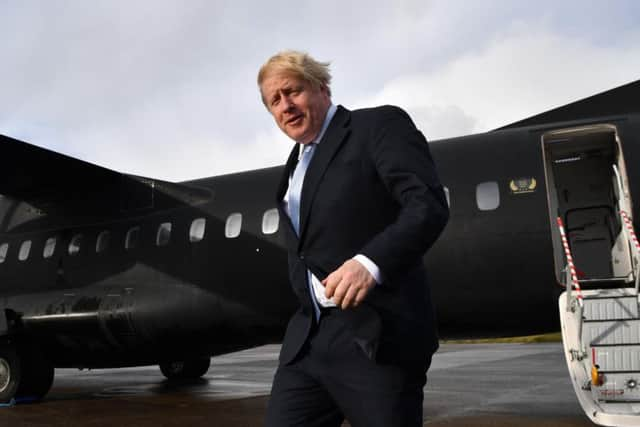Despite his big win, can Boris Johnson expect stormy weather ahead in Scotland?
The Scottish Conservatives had embraced his stance on "getting Brexit done", but also went into the election campaign with "no to indyref2" as a top slogan. Yet, despite Johnson's win - and his call today for old-fashioned One Nation conservatism - in Scotland his party lost seven seats and saw vote share drop by three per cent.READ MORE: Nicola Sturgeon branded ‘ungracious’ after celebrating Jo Swinson losing her seat
With the SNP winning 47 seats, there is undoubtedly one nation in the union that the Tories do not represent (though Northern Ireland can lay claim to being the least represented).READ MORE: General Election Results: This is how the constituency map of Scotland looks now
Advertisement
Hide AdAdvertisement
Hide AdAs a result, the mandate for a second independence referendum will again be claimed and Nicola Sturgeon is expected to push for a Section 30 Order quickly. But Johnson has been clear that he will not grant one. So where does that leave the "one nation" rhetoric and how will he prove to Scotland that he is a believer in it?


Unlike Thatcher, who spoke about "we in Scotland" there is very little "we" for Mr Johnson to cling to. While he may well want to get on with "getting Brexit done", the SNP will be a constitutional headache for him from the moment the House of Commons resumes.
However, he has pledged a £7.2billion spending spree on public services, particularly on the NHS, schools and policing by 2023, which will mean through the Barnett formula, Scotland will see more money coming from the Treasury. How the SNP chooses to use that will be vital - not to spend it on the same issues would allow Johnson to show that Nicola Stugeon is failing to invest in public services unlike him and therefore independence would be foolhardy. It's precisely the same political line that a Jeremy Corbyn government would have taken.
Of course, the First Minister is a canny operator, and will not want to be caught in a battle on public finance, so the potential detrimental economic impact of Brexit will be her refrain, alongside the need for "all the economic levers of independence".
What is increasingly likely is that the SNP will attempt a route through the courts to force a second referendum, and Johnson is all too well-versed in such challenges given his illegal prorogation of parliament.
His manifesto pledge to "hold a constitutional review" after Brexit to restore "trust in our democracy" certainly seemed to be pointed towards ensuring the courts cannot "interefere" in the actions of government. This would be hugely controversial and fought within the legal sector, but he would not be able to affect Scots law, so may well find himself in a battle on two fronts in Scotland - legally and politically.
Scottish businesses will also need to be wooed as the trade talks with the EU and then the US begin in earnest. The Scottish Federation for Small Businesses has already warned today that Mr Johnson needs to deliver a Brexit-deal with a transition period long enough for businesses to prepare for a change in trading conditions; hs urged MPs to make the case for a Scottish immigration system and for funding for towns.
Devolution of course means that the new Prime Minister's ability to affect Scots lives as directly as Margaret Thatcher is lessened - her policy of council house sales for instance would likely never have happened in Scotland if housing had been devolved at the time.
Advertisement
Hide AdAdvertisement
Hide AdBut look out for his new government, and his office of the Union, to make the most of extra spending in Scotland and to find policies among reserved issues which he will use to attempt to stymie any demand for a second referendum.